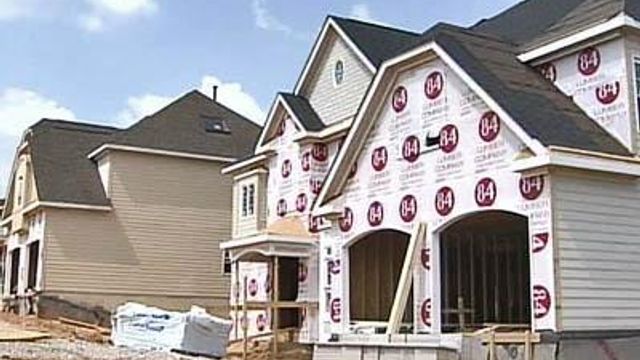Meeker Seeks Higher Fees, More Conservation, Better Transit
Mayor Charles Meeker on Thursday called for higher impact fees for new development, year-round water conservation measures and improved transit services across Raleigh.
Posted — UpdatedIn addition to outlining his priorities for his fourth term in office, Meeker also expressed his support for Councilman James West to continue as mayor pro tem, a position he has held since 2003.
Doubling the impact fees from $1,200 to about $2,500 on every new home would generate an extra $8 million to $10 million a year for the city to invest in roads and parks, Meeker said. It also would bring Raleigh's fee schedule in line with those in Apex and Cary, he said.
"Our fees have been very low," he said. "Even with this adjustment, approximately 70 percent of the cost of new roads and parks will be borne by current property owners."
Raleigh could adopt a sliding schedule for the fees so that larger homes are charged a higher fee than smaller homes, condominiums and apartments, Meeker said.
Home builders have said higher fees would be passed along to buyers, which could aggravate the slump in the housing market.
"The developer then has to analyze whether to pass that cost directly on to the consumer. That makes the cost of living here in the city higher," developer John Bruckel said.
Meeker said the City Council could work "to be reasonable about" impact fees so they wouldn't be so high as to discourage development.
"There are some communities that are talking about slowing growth, but Raleigh is not," he said. "What we're talking about is how we finance growth. The bottom line is, if we have better parks and roads, we can accommodate more growth going forward."
Studies have shown home buyers are ultimately the ones who pay impact fees, which could affect Raleigh's housing market, said Mike Walden, an economist at North Carolina State University.
"Any potential tax can slow growth," Walden said. "If we did see the impact fees raised in the city of Raleigh, people who would have bought a house (and) who would not normally buy a house will not (buy one).
"You still may see sales go up, but they would go up by a slower rate than if you didn't have the higher impact fees," he said.
Also on the development front, Meeker said he expects to present a resolution to the City Council next week to allow the use of public financing for private development only in blighted areas where development needs to be encouraged.
The developer of North Hills has sought $75 million in tax-increment financing from the city to build a parking deck at a planned expansion of the retail-office-residential project.
Such a deal would require the city to borrow the money and repay the loan with revenue generated from higher taxes paid on the project and nearby properties as their values increased. The city would pay more than $140 million over the 20-year life of the loan in the North Hills example.
Raleigh doesn't have any guidelines for the use of tax-increment financing, and Meeker said the proposed resolution would create standards for developers.
The resolution also calls for Wake County to chip in financing on such publicly funded infrastructure projects and sets requirements to guarantee repayment of such a loan.
Meeker said he also would ask the council to adopt permanent water restrictions that could limit outdoor water to once or twice a week in the morning or evening. The moves could save about 20 million gallons – about half a day's consumption – each week, officials said.
The city also would look at implementing variable water rates to charge more for heavy use, he said, noting the added fees could encourage more conservation.
"This will put us in a strong situation. It won't end future droughts, but it will teach us to conserve water all the time," he said.
Some local residents said there are already too many rules limiting what they can do at their home, while others said year-round water restrictions are overdue.
"We should have the privilege to do what we want to with our water," resident Christopher Pierce said.
"(Water) is a natural resource. We can't just go make more," resident Sarah Newton said.
Meeker also plans to talk with the Army Corps of Engineers, which manages Falls Lake, the city's primary reservoir, about increasing the lake's capacity. The Corps normally keeps the lake's level lower than it could, using the lake to accommodate stormwater runoff, he said. Meeker would like to see the normal lake level raised by a couple feet when water is available.
"I think this drought and two other droughts have taught us that water supply and water shortage is an ongoing issue," he said. "It's not just a one-time thing; it's not just a once-a-decade problem. It's something we have to deal with every year."
To better accommodate growth, the City Council should work to improve public transportation systems in Raleigh and across the Triangle, Meeker said.
Charlotte and Chapel Hill provide good models for Raleigh to examine in terms of providing frequent, reliable, point-to-point bus service to residents, he said.
"This is really key to our future," he said. "It will affect how we grow in the years ahead, and it's simply something we have to do so we don't have a lot of (road) congestion going forward."
Funding will be the main obstacle in transit planning, he said, noting the city receives inadequate state funding for such programs. But he said the City Council might be able to designate 0.5 to 1 cent of Raleigh's property tax rate – the city will likely roll back the rate next summer because of the recent Wake County property revaluation, he said – to fund public transportation locally.
Improved transit will help Raleigh extend its reputation as a "green city" beyond its parks and greenways to its environmental consciousness, Meeker said.
The city has been adopting more fuel-efficient vehicles and plans to install LED lighting in public parking garages and along Hillsborough Street to conserve energy.
Raleigh could set an example to both by local residents and other cities to encourage conservation and the decrease use of fossil fuels, he said.
"Being a green city is something that's not only the right thing to do, it's something the public really wants us to do," he said.
• Credits
Copyright 2024 by Capitol Broadcasting Company. All rights reserved. This material may not be published, broadcast, rewritten or redistributed.






